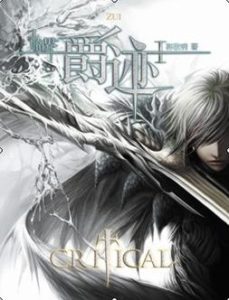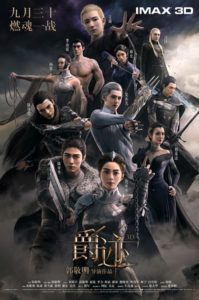L.O.R.D: Legend of Ravaging Dynasties
爵迹
China, 2016, colour, 2.35:1, 3-D, 117 mins.
Director: Guo Jingming 郭敬明.
Rating: 3/10.
A splashy, chaotic and poorly scripted fantasy whose ambition far outstrips its abilities.
Fuzu, a town in the ancient kingdom of Ashland. Orphan Qiling (Chen Xuedong), a waiter in a teahouse, learns from a customer, Shenyin (Yang Mi), that she is on the way with her elder brother Shensi to the capital Glanort to cach a soul beast, Frost Raccoon. Suddenly an icy freeze sweeps across the town and countryside, killing everything. Shensi escapes and in the forst comes face to face with its cause, giant winged lion Ice Fang. Qiling tries to rescue her but is knocked unconscious. Meanwhile, in the halls of power, Silver, Duke VII (Wu Yifan), is instructed by The Priest that his disciple has appeared and should be collected as soon as possible. Tereya, Duke IV (Guo Caijie), is instructed to help Dark, Duke II (Chen Weiting), in hunting down and killing the treasonous Feng When, Duke V (Yan Yikuan) and his disciple (Wang Yuan). When Qiling wakes up, by his side is Silver, who tells him he’s now his disciple (i.e. successor) whom he’ll take to the capital and on whom he’ll confer “soul power”. The next day, says Silver, they’ll set off for Soul Mound, so Qiling can select a magical weapon. Meanwhile, Shenyin hunts down Lotus (Fan Bingbing), Feng When’s disciple, in order to kill her, but Lotus escapes during their fight. Qiling and Silver reach the big city of Ryen and the former goes out to take part in the Cross-City Parade. In the street he’s approached by a representative of the noble family of Tenso to be a match for their 16-year-old daughter, Princess Yuka (Lin Yun). When he declines, Yuka pursues him, and during their fight he’s transported to the Soul Mound, where he meets Lotus, who’s just chosen her magical weapon, the Resurrection Chain. They’re joined by Yuka, and she and Qiling pick their own weapons. However, the three barely manage to leave Soul Mound alive, and are rescued at the last moment by Zillah, Duke III (Wang Duo), who takes them to Silver. He informs them that Feng When is heading to Eternal Island to find Hillure, Duke VI. Everyone sets off for the same place to finally solve the mysteries of why Feng When is accued of treason and why The Priest seemingly gave conflicting instructions to the dukes. But Eternal Island also holds several larger secrets of its own.
REVIEW
Billed as China’s first 100% motion-capture feature film, L.O.R.D: Legend of Ravaging Dynasties 爵迹 is nothing to celebrate about. Written and directed by one of the Mainland’s hottest young movie-makers – Sichuan-born writer-publisher-stylista Guo Jingming 郭敬明, 33, of Tiny Times 小时代 (2013-15) fame – it’s a splashy, chaotic and poorly scripted fantasy that may mean something to devoted fans of Guo’s original novel but as a standalone slice of entertainment simply overwhelms the viewer with a tsunami of CGI and a Sargasso of backstory.
Guo’s Tiny Times quartet, also adapted from his own novels, marked a watershed in the development of Mainland cinema, tapping into a very Shanghainese, fashionista culture through the stories of four huggy-and-spatty BFFs and their epicene boyfriends. The films, which grossed a combined RMB1.8 billion in China on a reported budget of some RMB150 million, were super-glossy nonsense aimed at teenage girls but at least had a sense of fun. L.O.R.D has no sense of fun and is complete nonsense – an attempt to create an entire fantasy universe on film that ends up as simply a splashy monument to Guo’s own ego, supported by so-so effects more befitting a computer game.
 The original novel, Critical 临界•爵迹, began serialisation in 2009 and was subsequently published in two volumes (Aug 2010, Jan 2011). Guo’s script gives no quarter to those who haven’t read and remembered every word of the books, plunging the viewer into a Mediaeval European-looking world inhabited by Chinese and apparently guided at a higher level by a series of Dukes who answer to someone called The Priest. The Dukes come and go and pass on their powers to disciples; there’s a lot of mumbo-jumbo about “soul loops” and “soul beasts” that may make sense on the printed page but isn’t condensed in a satisfactory way in the screenplay.
The original novel, Critical 临界•爵迹, began serialisation in 2009 and was subsequently published in two volumes (Aug 2010, Jan 2011). Guo’s script gives no quarter to those who haven’t read and remembered every word of the books, plunging the viewer into a Mediaeval European-looking world inhabited by Chinese and apparently guided at a higher level by a series of Dukes who answer to someone called The Priest. The Dukes come and go and pass on their powers to disciples; there’s a lot of mumbo-jumbo about “soul loops” and “soul beasts” that may make sense on the printed page but isn’t condensed in a satisfactory way in the screenplay.
Strip out all the CGI, motion-capture technology and Mediaeval European look, and L.O.R.D is basically a good old costume martial-arts fantasy. The characters can’t wait to get into fights and face-offs; the action, supervised by veteran Xiong Xinxin 熊欣欣, is effective, if staple; and the mixture of warring factions and rogue warriors is straight out of swordplay literature. The problem is that the film has no clear story arc, or sense of where it’s going, to help the viewer tag along; only about an hour in, when everyone congregates on Eternal Island to sort out the plot and backstories, does it develop a mild sense of direction. But by then the CGI has gone into Warp Drive 10, battering the exhausted viewer into submission.
As the plot implodes and the CGI takes over, even the so-so score by Japanese anime composer Kajiura Yuki 梶浦由记 struggles to keep pace, desperately adding vocals to the orchestral mix. Contributions by Tiny Times d.p. Che Liangyi 车亮逸 [Randy Che] and editor Qiao Aiyu 乔爱宇 are simply functional – especially Che’s, considering that the movie is 100% green-screened – and those by the actors are largely the same, with several having a “what the hell am I doing here?” look on their faces while trying to professionally hit their marks between all the expository dialogue.
As the naive, Candide-like hero who kicks off the story, Vancouver-raised actor-singer Wu Yifan 吴亦凡 [Kris Wu] is the only character with any humour, though it’s forced and rather fey. He has brief moments of chemistry with the pouty young princess of Lin Yun 林允 (who debuted strongly as the title character in Mermaid 美人鱼, 2016) before ceding the central spot to an array of poe-faced Dukes and Disciples. Among these, top-billed Fan Bingbing 范冰冰 brings the most character and authority to her role, with her face naturally adapting to a CGI look; other names, like Yang Mi 杨幂, Chen Xuedong 陈学冬 and Taiwan’s Guo Caijie 郭采洁 [Amber Kuo] – all from the Tiny Times repertory – just glower or pose.
As in the Tiny Times films, the metrosexual boys are often prettier than the pouty or vampy girls, and a whole atmosphere of sexlessness – exacerbated by the semi-anime look of the motion-capture process – hangs over the whole enterprise. At least Guo, who played a virtual-reality character in the equally awful Amazing 神奇 (2013), vamps outrageously, realising that motion-capture is all about facial expressions for an actor.
In its first week, the film grossed some RMB300 million in China, no small amount but way below expectations for a production of this scope and ambition. (Final tally was RMB383 million, following a rapid fall-off after the first week.) The story ends inconclusively, leaving room (yikes!) for a sequel.
CREDITS
Presented by Le Vision Pictures (CN), Shanghai ZUI (CN), Original Force (CN), Helichenguang International Culture Media (CN).
Script: Guo Jingming. Novel: Guo Jingming. Photography: Che Liangyi [Randy Che]. Editing: Qiao Aiyu. Music: Kajiura Yuki. Music supervision: Kamada Toshiya. Art direction: Xu Tianhua. Sound: Tao Jing. Action: Xiong Xinxin. Visual effects: Cai Zhengpeng.
Cast: Fan Bingbing (Guishan Lianquan/Lotus), Wu Yifan [Kris Wu] (Yinchen/Silver, Duke VII), Chen Xuedong (Qiling, Duke VII’s disciple), Chen Weiting (Youming/Dark, Duke II), Guo Caijie [Amber Kuo] (Teleiya/Tereya, Duke IV), Lin Yun (Tianshu Youhua/Tenso Yuka), Yang Mi (Shenyin, Duke II’s disciple), Wang Yuan (Cangbai Shaonian, Duke V’s disciple), Yan Yikuan (Guishan Fenghun/Feng When, Duke V, Guishan Lianquan’s elder brother), Wang Duo (Qila/Zillah, Duke III), Li Zhiting [Aarif Lee] (Nihong/Neon, Duke IV’s disciple), Fang Lishen (Gilgamesh).
Release: China, 30 Sep 2016.
